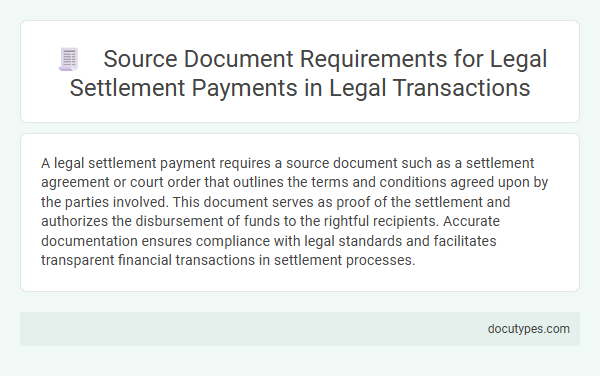A legal settlement payment requires a source document such as a settlement agreement or court order that outlines the terms and conditions agreed upon by the parties involved. This document serves as proof of the settlement and authorizes the disbursement of funds to the rightful recipients. Accurate documentation ensures compliance with legal standards and facilitates transparent financial transactions in settlement processes.
Introduction to Source Document Requirements in Legal Settlements
Source documents play a crucial role in verifying and processing legal settlement payments. These documents provide the necessary evidence to ensure accuracy and compliance during financial transactions related to settlements.
- Settlement Agreement - A formal contract outlining the terms and conditions agreed upon by parties in a legal dispute.
- Payment Authorization - Documentation that authorizes the disbursement of settlement funds to the appropriate parties.
- Proof of Identity - Verified identification documents of the settlement recipients to prevent fraud and ensure proper payment delivery.
Legal Basis for Source Documentation in Settlement Payments
What source document is required for legal settlement payments? The legal basis for source documentation in settlement payments is essential to verify the legitimacy and accuracy of the transaction. Your settlement payments must be supported by official documents such as settlement agreements, court orders, or release forms that provide clear evidence of the payment terms and obligations.
Types of Legal Transactions Requiring Settlement Documentation
| Type of Legal Transaction | Required Source Document for Settlement Payment | Description |
|---|---|---|
| Personal Injury Claims | Settlement Agreement | A legally binding document detailing the terms agreed upon by both parties for compensation of injuries. |
| Divorce Settlements | Divorce Decree with Settlement Order | Official court order that includes financial settlement terms, property distribution, and support obligations. |
| Contract Disputes | Written Settlement Contract or Release Form | Document specifying settlement amounts and release of claims between contractual parties. |
| Class Action Lawsuits | Court-Approved Settlement Agreement | Judicially sanctioned agreement outlining the distribution of settlement funds to class members. |
| Property Disputes | Settlement Deed or Stipulation Agreement | Formal document resolving ownership or usage rights disputes, often recorded with relevant authorities. |
| Employment Disputes | Settlement and Release Agreement | Contract outlining compensation terms and waiver of further claims between employer and employee. |
| Wrongful Termination Claims | Settlement Agreement with Confidentiality Clause | Document detailing payment terms and legal protections following termination disputes. |
| Debt Settlement | Settlement Letter or Agreement | Written confirmation of agreed debt repayment terms between debtor and creditor. |
Essential Source Documents for Legal Settlement Payments
Essential source documents for legal settlement payments include the settlement agreement, which outlines the terms and conditions agreed upon by all parties. Proof of payment authorization, such as court orders or payment instructions, is necessary to validate the transaction. Documentation of payment execution, including receipts or bank transfer confirmations, ensures transparency and compliance with legal requirements.
Verification and Authentication of Settlement Documents
Verification and authentication of settlement documents are crucial steps in processing legal settlement payments to ensure accuracy and legitimacy. Proper source documents provide the necessary evidence to validate the terms and authorize the disbursement of funds.
- Settlement Agreement - A legally binding contract outlining the terms agreed upon by all parties involved.
- Court Order - An official mandate issued by a judge authorizing the settlement payment.
- Proof of Identity - Verified identification documents of the payee to confirm the rightful recipient of the funds.
These documents collectively verify the legitimacy of the settlement, preventing fraud and ensuring compliance with legal standards.
Common Pitfalls in Settlement Documentation Compliance
Legal settlement payments require precise source documents to ensure compliance and avoid disputes. Commonly, a fully executed settlement agreement serves as the primary source document for authorizing payment.
Failure to include detailed release forms or verification of payment terms often leads to compliance issues. Missing notarizations or improper signatures are frequent pitfalls that can invalidate settlements. Ensuring all documents are complete and properly executed mitigates risks of legal challenges and audit failures.
Confidentiality and Privacy Issues in Settlement Document Handling
Legal settlement payments require carefully managed source documents to ensure accuracy and compliance. Handling these documents involves strict confidentiality and privacy measures to protect sensitive information.
- Settlement Agreement - The primary source document outlining the terms and conditions of the settlement payment.
- Confidentiality Clauses - Legal provisions embedded within settlement documents that restrict unauthorized disclosure of sensitive information.
- Document Access Controls - Procedures implemented to limit access to settlement documents only to authorized personnel, ensuring privacy protection.
Regulatory Guidelines Governing Legal Settlement Source Documents
Legal settlement payments require precise source documentation to ensure compliance with regulatory standards. Such documents typically include settlement agreements, court orders, and proof of payment validation.
Regulatory guidelines mandate that these source documents clearly detail the terms of the settlement, parties involved, and payment amounts. Proper documentation supports audit trails and prevents disputes in legal and financial reviews.
Recordkeeping and Retention Periods for Settlement Documents
Source documents required for legal settlement payments typically include settlement agreements, release forms, and proof of payment. These documents serve as critical evidence to validate the terms and execution of the settlement.
Accurate recordkeeping of settlement documents ensures compliance with legal and financial regulations. Your retention period for these records often ranges from 5 to 7 years, depending on jurisdiction and organizational policies.
What Source Document Is Required for Legal Settlement Payments? Infographic

